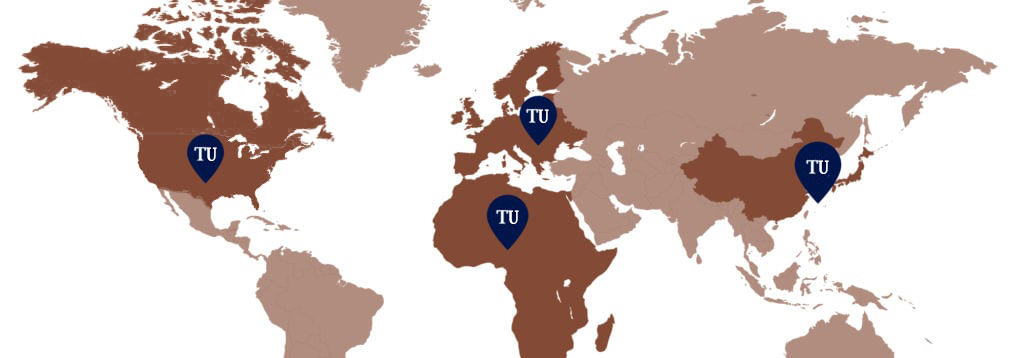PhD Program Overview
The PhD program in business is designed for leaders who have a passion for research, innovation, a desire to make a profound difference.
Our PhD Program
If you hope to gain tremendous credibility and desire to become a recognized expert in a specific field, this program will propel you like nothing you have ever experienced.
Within a proven executive development framework, the curriculum design offers an unrivaled strategic focus on your growth as an integrated individual from a multiple intelligences perspective, in addition to the scholarly development. Designed by globally renowned researchers and experts in various fields of business, psychology, sociology and engineering, the course enables you to begin the journey as a systemic scholar through original research and further develop key theories that helps societies advance from a systemic perspective. With a focus on grounded theory, this course provides you the critical and systemic thought necessary for creating innovative theories and concepts that transforms your business environment. Especially with the global pandemic, many theories are no longer relevant. This program is designed for those who demand the tools to create new theories and systems.
The Highlights & Learning Outcomes
Two modalities of learning:
Traditional: Classes meet once every 2 months, for four consecutive days
Online (distance learning): Classes meet virtually weekly
With our ongoing enrollment, start when you are ready!
You deserve more in graduate education
- More practical solutions
- Enhanced Emotional Intelligence and wisdom
- Greater influence
Transcontinental University offers the most practical and global education in the marketplace.
Learning Outcomes
Develop a substantive knowledge with a systematic understanding of the theoretical underpinnings of business theories and concepts
Master the analytical and methodological competencies necessary to critically assess existing theories in business
Design and conduct original research with consideration for the cultural and time perspectives that contributes to empirical and theoretical knowledge in business
Develop a substantive knowledge with a systematic understanding of the theoretical underpinnings of business theories and concepts
Master the key theories underpinning an original and innovative research with significant depth in order to produce advanced and well-grounded research
Develop effective communication skills to engage and empower a diverse (specialized and non-specialized) audience as a scholar regarding the relevance of theories, applications and practical solutions for global business challenges
Demonstrate the ability and desire for high ethical standards in business research and practice
Curriculum
Much more than a standard research PhD, our curriculum design is based on the needs of the post pandemic business environment, which has shown us the ineffectiveness of many practices and theories. Led by a very diverse international faculty, the curriculum integrates the body of knowledge and current business needs throughout the program. It starts with equipping learners with the essential tools for theory creation, then introduces systems thinking. The latter courses applies systems thinking with individual systems such as knowledge and intelligences and larger systems such as organizational culture and change. While learners develop leadership and research skills along with multiple intelligences, the unparalleled academic learning model and integrative curriculum design provide meaningful learning that launches learners forward in their professional and academic careers.
This PhD program is extremely unique with a focus on systems thinking – an in-depth mastery of the interconnectivity between various theories and current business environments. The pandemic has shown us the countless system-wide failures in the various fields of healthcare, government, and business. As scholars, the traditional myopic practice of categorization has greatly limited the multiple intelligences of scholars. Within our innovative framework, learners will develop themselves from theory to critical practice, from individuation to communalism; they will collaborate beyond pre-pandemic knowledge to systemic knowledge. Learners will also build consistent systems of accountability and responsibility for the changes they see, experience and create within the world. The curriculum also develops a reflective recognition of existing theory and a challenge to create new theories from what learners are experiencing in the “new normal” from the global pandemic.
- RES801: Introduction to Social Science Research and Quantitative Methods
This course introduces learners to the field of social science research. As the first research course , it introduces specific requirements of scholarly research and authoring. The course then examines in depth the research process and introduces learners to the various aspects of doing scientific research with a specific focus on quantitative methodology, providing practical advice and insight in the field of business.
- RES802: Qualitative Research Methods
This course introduces you to the field of qualitative research – non-statistical social science research. It examines in depth the research process and introduces future scholars to the various aspects of doing scientific research, providing practical advice and insight in the field of business.
- RES803: Grounded Theory Research
This course introduces the qualitative approach of grounded theory research. It provides foundational knowledge to build credible theories within a dynamic environment such as a global pandemic. These are the foundational concepts needed before planning, coding, analysis, and theory construction, which is the process of theory building from qualitative data.
- DOC820: Application of Systems Thinking
This course begins to explore the dynamic nature of business within a complex network of systems, the rapid change in globalization, the fundemental lessons from the pandemic, and the leadership skills necessary for success. It also explores the lack of systems thinking that led to the global pandemic and the systems that drive success in the “new” normal.
- DOC821: Mastering Epistemology
This course introduces the philosophy of knowledge which guides learners with a deeper understanding of the complexity of knowledge as an individual system. A strong foundation for PhD learners start with an understanding of individual philosophies that relate to definition, purpose, acquisition and application of knowledge.
- DOC822: Emotional Intelligence and Ethics
This course initiates an exploration into the mindset and psychological framework of successful leaders in conventional organizations. With a focus on emotional intelligence (EQ) to maximize ethical behaviours, the course challenges learners to explore oneself while creating a foundation for the development of emotional intelligence as a systemic intervention within an organization.
- DOC823: Organizational Culture, Change, and Leadership
This course explores larger systems in organizations that influence culture, change, and leadership. It provides critical thought on the effectiveness of existing theories and challenges learners to think on a systemic level.
- RES850: Dissertation Research
The dissertation research is the final course of study in the PhD programme. It is a culmination of all that was learned within the programme focused on a specific topic. This study combines the rigors of academic research with a critical reflection of existing theories, especially considering the dynamic world of business.
Leadership/Management Concentration
- MGT800: Contemporary Leadership and Management Theories
This course provides a survey of classic and emerging management and leadership theory with a focus on systemic leadership thinking for the 21st century. Learners are expected to demonstrate a critical application of management and leadership theory in an organizational context. The course also explores the decision processes for when to apply management practices and when to apply leadership practices. Both individual and group creativity are developed through the strategic choices of management and leadership practices.
- MGT801: Human Capital Development
This course focuses on the most recent theories and concepts in human capital development within a global environment. It explores the theories of human resource management and the journey towards human capital development. Further integrating emotional intelligence and systems thinking, this course challenges learners to critically apply systemic thought in the design of learning systems.
- MGT802: Change Design and Implementation
This course provides an in-depth assessment of contemporary change theories and their effectiveness within global environments. It investigates the difference between change management and change leadership and the relative significance of their practices. The course further explores the alignment between organizational design, leadership philosophy, and change processes. Learners are challenged to design an organizational change system that leads change within the team, the organization, and the respective industry.
- MGT803: Seminar in Management Systems
This course provides critical insights on current management practices and their respective theories from a systemic perspective. Experts within the field of management will share their respective experiences, problems and solutions. Learners will explore management systems in contemporary businesses, which helps to inform them in the direction of their dissertation research.
Entrepreneurship Concentration
- ENT800: Entrepreneur Mindset and Continuous Innovation
This course explores the mental schema and traits of successful entrepreneurs. It challenges learners to reflect on their thought process and explore its systemic foundations of beliefs and values. Furthermore, the course provides strategic insights to continuous innovation from a systemic perspective for small businesses, leveraging emotional intelligence and systems thinking as its foundation.
- ENT801: Marketing Strategy and Development
This course provides strategic insight into principles in marketing for small businesses. Standard theories of marketing are presented along with the importance of social media and google analytics. Learners will explore current practices of entrepreneurial marketing and business development, while comparing them to theoretical perspectives.
- ENT802: Learning Systems in Entrepreneurial Management
This course integrates learning systems with management theory and practices in entrepreneurship. Synthesizing theories and practices from educational psychology, systems thinking, organizational learning, and culture, the course defines the creation of learning systems to sustain innovation at all levels of a small business. Students will design a proactive learning system within an SME to create an adaptive strategic engine that sustains competitive advantage while making efficient management practices.
- ENT803 – Seminar in Entrepreneurship
This course is designed to provide doctoral students with broad exposure to a current and substantive topic area in entrepreneurship. Further integrating systems thinking, organizational learning, marketplace demands, and leadership theories, students are challenged to explore entrepreneurship within the context of major events, such as the global pandemic in 2020. Students will critically analyze and synthesize entrepreneurship theories and practices with significant events. Student undertake scholarly research on a topic determined in collaboration with the professor.
PhD Finance Concentration
- FIN 800: Financial Decision-Making and Risk
This course provides an understanding of the accounting and financial information, a critical application of tools and techniques used to enable sound financial decision making, and a systemic understanding of risks inherent in the corporate management context with tools, techniques and strategies to identify, analyze and control risk. Students will learn to make strategic choices based on massive financial information and psychological influences.
- FIN801 – Corporate Governance and Finance
This course explores the application of fundamental business principles to business practices in order to demonstrate the strong linkage between sound governance and financial performance and value. Addressing the subject in a comparative and interdisciplinary manner, the course also explores the nature of the corporation, the basic theory of the firm, and the internal and external architecture of corporate governance. Key components covered include building successful and sustainable growth models, the creation of organizational structures directed towards opportunity management, growth, sound oversight, and value creation. Students engage in synthesizing the essentials of gaining and sustaining competitive advantage via current governance theories practices and strategic finance. The course examines a wide range of corporate finance and governance formulations and implementations and tests these concepts in various contexts and risk environments. Preliminary Learning Outcomes: Identify and analyze corporate governance (agency) problems; Assess how corporate governance shapes corporate finance, including capital structure, investment decisions, and capital costs; Analyze how the corporate governance influences an organization’s economic performance; Critically assess and apply Capital market theory, Risk and return statistics, The Capital Asset Pricing Model, and Markowitz’s portfolio theory with complex corporate governance environments; Create compensation strategies for value creation for multinational enterprises; Design Corporate governance reform strategies
- FIN802: Investment Analysis & Portfolio Management
This course will explore the topics of theoretical and practical approaches to effective investment analysis and valuation along with issues related to portfolio optimization and performance evaluation. It also guides students to critically assess the current risk management instruments used to manage the risk in equity market. The course integrates systemic perspectives into the mutual fund investment and portfolio management practices, especially with global enterprises that conduct foreign direct investments in emerging economies.
- FIN803: Seminar in Finance
This course exposes doctoral students to novel finance research in the areas such as capital markets, investment/hedge funds management, corporate finance, banking, risk management, behavioral finance, valuation, and computational finance and forecasting. Further integrating systems thinking, students are challenged to explore financial decisions within the context of major events, such as the global pandemic in 2020. Students will critically analyze and synthesize financial theories and practices with significant events. Students undertake scholarly research on a topic determined in collaboration with the professor.
I love the engaging format. Working with the team, learning how to communicate in an open and inclusive manner. So counterintuitive to how I have seen most training and education conducted
Thank you for your comments, wisdom and for facilitating my learning with behavior of others in an organization. This course help me build on my ability to be a manager, leader and to have the ability to formulate a plan for problem solving. Critical thinking or thinking outside the box is an essential quality for a person in the helm of an organization. This course has improved on my abilities and will be used in future situations that may arise.
I must say you sure wore your glasses on your nose (lolol). Every step of the way you were there pushing us in the back hard! (ouch). But I think I can now take a breather and feel like I’ve accomplished something. Even though you made us work, it felt like I was an entrepreneur traveling back and forth on the road. I was getting tired and drained at times but I hung in there. I think the entire class did also. I hope to always be in touch and continue to excel in my experience. Who knows maybe you might find me on here teaching a course (haha).
Thank you for helping me successfully complete my doctoral degree. I know my research topic wasn’t the easiest since it was on the edge of new knowledge. Your guidance was always timely and supportive.
I have to thank you for creating the environment enabling us to search for excellence and the good in ourselves and in others. It is quite possible that your course – in its methods and personal empowerment – will have the greatest impact on us – no longer students but as emerging leaders. With such lofty (yet achievable) goals… we can contribute to improving the quality of life for others and ourselves and the business stakeholders.. All while maintaining our integrity and expecting it from others.
I have learned so much from your mentoring through the dissertation research. Each step of the way, you were there for me with answers that guided me and challenged me. While I must say I didn’t like how you never just gave me the answers, but now I understand the wisdom of your guidance to teach me how to fish. I thank you for the great patience you’ve shown me. I’m a better researcher.
The Transcontinental professors were the most caring and practical professors I’ve experienced. They brought their consulting experiences into the classroom to make the theories come alive. I’m able to create proposals and gain respect at the national level because of what I learned. I highly recommend them to anyone who wants to exceed in their careers.
I love the participation in our workshops and being challenged to use the tools and practices as a group during exercises. Watching the practices play out in a real-time situation is helping me grasp the information and recognize opportunities to implement the tools or improve my approach to the situation.
I want to reiterate that to you how important this class was. The personalized challenges based on each one of our needs was extremely valuable. Speaking for myself, even noticing something as simple as my nervous tick of smiling all the time made me realize how inappropriate that comes off to the audience when discussing serious topics. If at all possible I’d advocate for a Pt 2 to this course where we do more in-depth technical discussions.
I learned more about myself and the things I need to watch for when communicating than I have in the last 15 + years as an analyst.
The knowledge I gained has helped me move from a lecturer to a professor and now a dean of the business school. I’ve been able to consistently publish in peer-reviewed journals with the research knowledge I’ve learned.
Admission & Eligibility – PhD Program
Entry requirements for the PhD course are as follows:
Master degree from an accredited institution
An official transcript for a completed master degree
A GPA of 3.5 or higher
No GRE Requirement
Minimum 4 years of relevant managerial/ professional experience or 4 years of academic experience
Personal Essay



Join the Global Network of Powerful Leaders

Where Some Of Our Students Work








Program Investment
Your PhD program tuition has no hidden fees. Learners can pay with a single payment for the entire program or arrange to be on a payment plan. No need to calculate credit hours fees or course fees like others. Your tuition gets you access to the most advanced MBA program, along with a powerful development framework, world class faculty, an integrative curriculum, and many more over 4 years of study.
Online Program Tuition
No hidden or miscellaneous fees
(Tuition may be lower depending scholarship availability)
$32,685
Hybrid Program Tuition
No hidden or miscellaneous fees
(both face-to-face and online. Tuition may vary
depending on location and scholarship availability)
$42,685
Monthly Payment Option
(for 36 months with the Online Program )
$945


